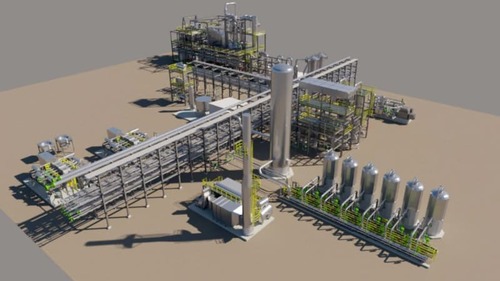
Zaragoza City Council is working on creating a plant that will transform waste into valuable elements such as hydrogen and methanol. The plant will complement the Circular Biocarbon project and contribute to Zaragoza's goal of becoming a Climate Neutral City by 2030. The project aims to recover 100% of the waste, either by reusing materials, generating energy, or transforming non-recyclable waste into valuable molecules. The project will achieve the Zero Waste objective and contribute to the city's circular economy without CO2 emissions. The total investment for the project is estimated to be around 280 million euros.
The dream of a "Zero Waste" city may not be so far away. Zaragoza City Council, in collaboration with the companies Urbaser, OMNI and Abacus & Partners, is already working on the creation of a plant, complementary to the current Waste Treatment Complex (CTRUZ), in which all the waste that is currently not recovered and ends up in the landfill will be transformed into valuable elements such as hydrogen and methanol.
This is a state-of-the-art refinery, which would complement the Circular Biocarbon project, presented in June 2021, financed with 15 million euros by the European Union, in which Urbaser continues to make progress together with partners from 11 different countries.
The CTRUZ plant, one of the most advanced in Europe, is a key part of Zaragoza's goal to be one of the 100 Climate Neutral Cities by 2030. In fact, our city is among those that recover the highest percentage of its overall waste: 53%. But the goal now being set is much more ambitious and consists of 100% of the waste being recovered, either by reusing materials or generating energy, as has been the case up to now, or by transforming these remains, especially the non-recyclable ones, into molecules as valuable as methanol and hydrogen.
The circle of waste management is completely closed, avoiding the dumping or incineration of non-recyclable fractions. In addition, it achieves the Zero Waste objective and contributes to the practical reality of the city's circular economy, all without CO2 emissions.
The Councilor for Public Services and Mobility, Natalia Chueca, presented the project this morning, "which would square the circle in terms of sustainability and circular economy". Chueca recalled that "from the first minute of our management, not only in my area but transversally throughout the City Council, we have been committed to environmental sustainability as one of the essential objectives for the near future. To the projects underway related to mobility, the environment or energy, we can now add this one - he explained - which would make Zaragoza the first European city capable of recovering and recovering absolutely all its waste, without generating a carbon footprint and, moreover, obtaining an economic return in return".
With this project, an enormous economic saving would be achieved in the long term, since the current regulations oblige the administrations to pay significant amounts for each ton that ends up in the landfill. "The necessary investment would be largely amortized by these savings and by the sale of the hydrogen and methanol obtained".
The Zaragoza Zero Waste Project consists of two phases:
1.- Zero Waste to Landfill, 2023-2028
Construction, testing and start-up of a Non-Recyclable Waste Refinery with the capacity to treat the 150,000 tons of non-recyclable waste that are deposited annually in the controlled landfill of the CTRUZ.
The core of the refinery is the OMNI200 system for converting the waste into synthesis gas (a gas consisting basically of hydrogen and carbon monoxide (H2 and CO). The planned plant will have two synthesis gas processing lines to produce 66,000 tons/year of methanol, and will save emissions of nearly 100,000 tons/year of CO2eq (the equivalent of a forest of 580,000 trees).
The first treatment line of the Waste Refinery is scheduled to come into operation in the last quarter of 2026. Thereafter, the waste stream sent to landfill will be reduced by half.
In 2028, the second line of the Waste Refinery is scheduled to come on line. This will not only bring us very close to achieving the Zero Waste target, but will also prevent further methane emissions in the controlled landfill, with an effect equivalent to an annual reduction of around 90,000 tons of CO2eq per year (the equivalent of a forest of more than 500,000 trees).
In accordance with the recently approved extension of the RED Directive 2018/2001 on renewable energy, these products manufactured at the Waste Refinery will be considered as Recycled Carbon and, as their carbon footprint is very low, they will contribute to achieving the renewable energy targets1.
The expected investment for this first phase is 188.1 million euros.
2.- Zero net emissions by 2030
Zaragoza is to become a hub for the production of green hydrogen of electrolytic origin manufactured from renewable energy generated in the area.
The Waste Refinery will need almost 14,000 tons of green H2 to manufacture another 70,000 tons of E-methanol from the CO2 captured in its process. With the start-up of this phase, all the methanol produced will have a "zero" carbon footprint, meeting the zero net emissions target.
The planned investment in this second phase for E-methanol production will be 91.4 million euro.
The total investment of the project will be around 280 million euros and will be self-financed with the sale of the methanol obtained at the plant to chemical industries for conversion into plastics and other products. European funds for the initial investment will also be available from several direct programs of the European Commission, which support innovative projects and projects that reduce the carbon footprint or circular economy.
When the project is fully operational in 2030, Zaragoza will become the first city in the world with zero waste to landfill and zero emissions from waste management. All at no additional cost over and above current costs.